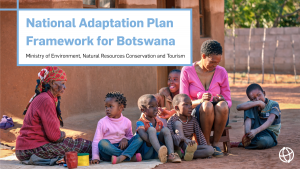
In 2001, Botswana submitted its Initial Communication to the United Nations Framework Convention on Climate Change (UNFCCC), providing a useful tool for decision making about national climate change impact assessment, adaptation, and mitigation planning. Since then, adaptation projects and policies have been developed, though the lack of a national framework to guide and harmonize these efforts has stunted the overall progress on climate change adaptation planning, development, and implementation.
With the development of the National Adaptation Plan (NAP) framework, however, Botswana has achieved a significant milestone in the climate change adaptation sphere. The NAP framework will contribute to the country’s efforts by guiding the development of the NAP process, which will, in turn, give direction to and harmonize sectoral initiatives.
The framework’s contributions to Botswana’s NAP process are as follows.
Adopting this framework will emphatically and indisputably contribute to the country’s NAP process by implementing inclusive stakeholder involvement in the NAP process. The NAP process requires the identification, engagement, and participation of all key stakeholders. Previously, participation was sub-optimal for communities at the grassroots level as well as for key actors in the private sector. This was mainly due to the fact that there were no defined institutional arrangements allowed for their participation in climate change adaptation. The NAP framework, however, calls for the comprehensive identification and involvement of all sectors. Engagement will be achieved through robust horizontal and vertical integration to ensure the active involvement of all sectors and actors in the country. Furthermore, this NAP framework calls for the establishment of the Climate Change Unit, which will facilitate the active participation of all stakeholders and link all parties (public, private, civic, and grassroots communities).
Furthermore, the NAP framework calls for national resource mobilization for the NAP processes. Adaptation is an expensive process, given the cross-cutting nature of climate change. The NAP process will require significant support from the central government and the private sector. By advocating for NAP mainstreaming into local and national planning and decision making, the NAP framework will contribute greatly to the processes. Line ministries and districts will plan and budget for adaptation activities yearly. Moreover, the NAP framework also calls for the active participation of the private sector, which will also bring in much-needed financial and innovative technological resources.
Finally, the NAP framework has outlined the plans and direction for monitoring and evaluation (M&E) of the NAP process. Most sectors have already developed comprehensive sectoral adaptation measures, including integrated water management, ecosystem-based management, fire management, and smart agriculture, among others. The lack of an M&E framework means that the reporting and feedback of already developed adaptation measures have not occurred. This framework will lead to improvements in M&E that will be central and nested in the existing national M&E systems. Consequently, improved M&E will create a conducive environment for sectors to implement and report on their adaptation progress.
In addition to these contributions, the development of the NAP framework led to several critical lessons.

LESSON #1:
The importance of prioritizing climate change adaptation within targeted sectors was the primary lesson. During the consultative process of the NAP framework, some sectors indicated that climate change was not prioritized because it did not fall under a mandate. Many departments viewed climate change as the strict mandate of the Department of Meteorological Services (DMS) and did not consider it within their own mandates. However, contradicting this perception, most participants acknowledged that climate change is a cross-cutting phenomenon and, therefore, could not and should not be the sole responsibility of the DMS. Consequently, adoption of the NAP framework should overcome this misconception, as line ministries and sectors will be required to mainstream and integrate climate change into their mandates.
LESSON #2:
Another lesson learned through the framework development process is the substantial progress in adaptation that has already been made nationally. Examples include smart agriculture, integrated water management, increased emphasis on ecosystem-based management and the application of ecosystem-based approaches. These actions should be highlighted and used to inform the development and implementation of further adaptation actions.
LESSON #3:
Additionally, the existence of a conducive environment for national adaptation planning and implementation became clear during the development of the legal and policy framework. The country has developed and implemented various key legal instruments that support the NAP process in Botswana. For instance, the draft Botswana Climate Change Response Policy, the National Drought Management Strategy, the draft Disaster Risk Reduction Policy, the water policy, Vision 2036, and National Development Plan 11 all acknowledge climate change as a developmental adaptation issue that must be mainstreamed into development planning processes.
LESSON #4:
Lastly, the NAP framework has highlighted critical NAP process steps that the country must undertake. These steps will contribute greatly to guiding the country through the NAP process and ultimately achieving the ambitious objective of climate-proofing the economy. Some of the critical steps include a stocking-taking exercise on gaps and the need for the NAP process; design and implementation of sectoral NAP processes; guidelines for mainstreaming of the NAP process at the national and sectoral levels; the creation of an information-exchange platform; and the development of an institutional arrangement engagement strategy.
Any opinions stated in this blog post are those of the authors and do not necessarily reflect the policies or opinions of the NAP Global Network, its funders or Network participants.